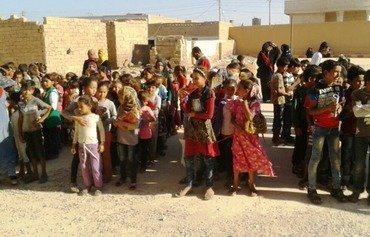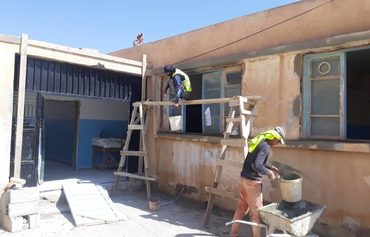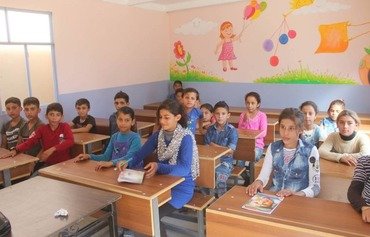Al-Raqa Civil Council has been getting ready to send children in liberated areas of the northern Syrian province back to school after years of absence under "Islamic State of Iraq and Syria" (ISIS) rule.
To this end, the council has been training teaching staff, rehabilitating school buildings and reminding parents and children of the importance of education.
The council's education committee has been racing to complete preparations for the 2017-2018 school year before the end of September, said Mohamed Hassan, who is training new teachers at the council-affiliated Ain Issa Education Centre.
Schools that are ready will start classes in mid-September, he told Diyaruna, with others schools slated to follow as soon as they become ready.
Teacher training
"Training is under way for the educational and administrative staff," Hassan said, adding that teachers will be hired once they successfully complete a two-month training course.
The 365 male and female teachers who have received training will join veteran teachers and administrators with significant experience, he noted.
"Teacher salaries will be the responsibility of al-Raqa Civil Council, as will school supplies and preparing and equipping the schools," he said.
A number of teachers also have received training at the Democratic Society Training Academy in the village of Tel Habasha in Amoda district, he added.
"Al-Raqa Civil Council has initiated collaboration with everyone to restore schools to the people of al-Raqa," Hassan said.
"Some organisations have provided assistance, and in some towns, residents have donated school buildings and basic equipment," he said. "In some areas, residents have even opened their homes for the education of children."
"It is vital that children in al-Raqa return to school," he added. "The council is determined to ensure the success of the mission, since past events and ISIS’s control of the region have kept some children away from school for three or four years."
The council's education committee is working to remind parents and children about the importance of returning to school in order "to combat the ignorance that ISIS wanted to instill in the minds of the new generation", Hassan said.
Rehabilitating schools
The cost of rebuilding and renovating some of the schools is very high, Al-Raqa Civil Council construction committee head Abdullah al-Erian told Diyaruna.
"Nevertheless, work is currently under way to prepare usable and partially usable schools to receive students," he said.
These schools are in areas that stretch from northern rural al-Raqa to the outskirts of Ain Issa, he said, and offer two shifts, morning and afternoon, in order to accommodate the largest possible number of students.
The total number of schools that will be opened is yet to be determined, he said, as work is still ongoing, and the security situation is a determining factor.
It is inconceivable to open schools that could come under threat, he added, stressing that "all the schools that will be opened will be in totally safe areas".
The reopening of schools is a joint task for all committees and offices, he said, adding that it is one of the council's top priorities.
'Social scourge that needs to be addressed'
Veteran teacher Mahmoud al-Matar, who fled al-Raqa city for the northern part of the province, told Diyaruna that most teachers in the region fled the area.
There are not enough teachers left to restore school life to its former state, so new teachers have been hired and enrolled into intensive training courses conducted by al-Raqa Civil Council, he said.
It is of vital importance that the council reopen schools, he said, "as there is a generation of children who have not received any education at all".
"This is a social scourge that needs to be addressed by all means possible, and requires efforts by everyone, without exception, because it is in everyone’s interest to overcome it," he said.
Al-Matar said he experienced ISIS rule before he fled al-Raqa, "and I saw with my own eyes how the group banned real education and replaced it with the dissemination of its own dark terrorist ideas".
"Unfortunately, many children fell into this trap, and their minds were altered, and the disaster would have been worse had the war against the group not been waged and the liberation operation not been launched," he said.
"Liberation from ISIS will only be complete when awareness and knowledge is once again disseminated among children," he said.
From the academic standpoint, al-Raqa’s children require special handling because of the age gap among students in each class, al-Matar said.
"For example, there is a large number of children over the age of 10 who have never set foot in school, when they should be completing their elementary grade level, or at least be in 3rd or 4th grade," he said.
The initial period will be the hardest, but will not last long, he said, as children will eventually get accustomed to discipline and to focusing in class.

![Teachers receive training at the Democratic Society Training Academy in the village of Tel Habasha in Amoda district of al-Raqa province. [Photo courtesy of Al-Raqa Civil Council]](/cnmi_di/images/2017/09/13/9509-Syria-Raqa-training-600_384.jpg)






